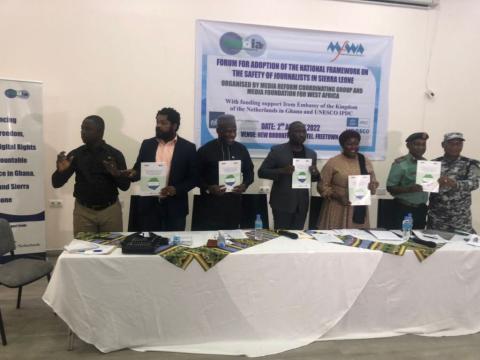By Chernor Alimamy Kamara
The Media Reform Coordinating Group (MRCG) has adopted a comprehensive national framework for the safety of journalists in Sierra Leone.
In his statement, the Head of Media and Public Relations in the Sierra Leone Police (SLP), Assistant Commissioner of Police (ACP) Brima Kamara noted that the word safety in the document tells you that the SLP has a role to play which falls within the remits of Force. He said the Police have a statutory as well as constitutional responsibility to protect lives and properties.
He stated that they have had issues with journalists while in their line of duties. He said, whiles the journalists always want to ensure that they meet to deadline in producing the news; they always have confrontations with the police and at the end of the day frictions occur.
“The SLP is always committed to protecting the safety of Journalists in Sierra Leone,’’ he said.
President of the Sierra Leone Association of Journalists (SLAJ), Ahmed Sahid Nasralla, who was also part of the National Committee on Safety of journalists, stated that the adoption of the Framework is a huge milestone in the history of safety and security of journalists in Sierra Leone equally. He said, for the past 50 years, the safety and security of journalists and the relationship between the media and the security sector have been a horror story to narrate from one-party rule to military rule and multi-party democracy.
He stated that past executives of SLAJ have been issuing press releases condemning the assaults on journalists in the country. He said those press releases have been issued for over 50 years to show that they are not happy with those assaults, but that nothing has changed so far.
Nasralla stated that, when he came in as president of SLAJ, he decided to change the approach from press releases to engaging the security sector.
“The police are human beings as well, so we need to understand ourselves,’’ he said.
He pointed out that, they were able to convince the security sector to append their signatures on a Memorandum of Understanding (MOU) for the adoption of the National Framework on the safety of journalists in Sierra Leone.
In giving the rationale and highlights of the Framework, the Chairman of the Independent Media Commission (IMC) who is also part of the MRCG Advisory Board, Dr. Victor Massaquoi, noted that the media ethics system in the country has been calling for a day like this for the adoption of the National Framework on the safety of journalists in the country. He said from 2018 to 2021, the United Nations (UN) did a study that reveals that over 1,500 journalists across the world are either being killed, tortured, or abused while in their line of duty.
He said journalists set the context in which the safety and security for journalism in the country come into force. He added that journalists faced challenges more so when they are not safe in the execution of their duties.
“I am sure that is going to change giving the assurances given to us by the security sector,’’ he said.
Dr. Massaquoi referenced the documents launched which talk of the rationale for the comprehensive National Framework for the safety of journalists which he said fits within the international discourse on safety mechanisms for journalists. He said the documents highlighted studies from various countries which shows that in recent years, there has been disquieting evidence of the scale and number of attacks against the physical safety of journalists and media workers as well as of incidents affecting their abilities to exercise freedom of expression by threats of prosecution, arrests, imprisonments and the like.
He recalled the first-seventh edition of the MRCG press Freedom report, from May 2018 to November 2021 which recorded 39 cases of freedom of expression violations.
The Deputy Minister of Information and Communications, Solomon Jamiru, mentioned that the safety of journalists not just in Sierra Leone but across the world should be a key concern. He assured that the government is not just concerned about the independence of the media but the safety of media practitioners is of top priority. He said a complete journalist should be independent and viable.
The Comprehensive National Framework for the safety of Journalists in Sierra Leone is part of efforts to reduce incidents of media rights violations, increase responsiveness by authorities to addressing media rights violations, and reduce acts of impunity for crimes against journalists in the country.








